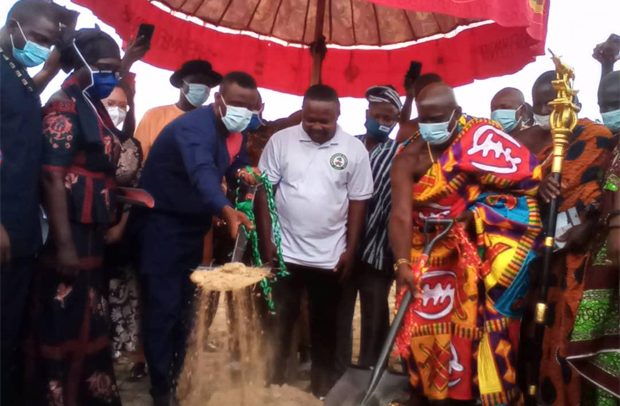Kwabena Okyere Darko-Mensah and some traditional leaders at the sod-cutting ceremony
WESTERN REGIONAL Minister, Kwabena Okyere Darko-Mensah, has cut sod for the construction of phase one of an industrial starch factory in the Wassa Amenfi East Municipality of the Western Region.
The first phase of the project, which has commenced, will cover an area of four acres and is expected to produce 20 tons of industrial starch per day.
The phase two, which would start in the next six months, would cover an area of 15 acres and would also produce 300 tons of industrial starch per day.
The project is under the government’s ‘One District, One Factory (1D1F)’ policy and is being established by the Amenfi Farms Ghana Limited in the Wassa Amenfi East Municipality.
Over 5,000 direct jobs and 2,200 indirect jobs are expected to be generated from the project.
The raw material for production, cassava, is currently ready on the company’s farm.
The regional minister praised the company for strategically following the planning process by planting the raw materials before the factory was established.
“I believe this factory should be completed ahead of time; employing people, will have a multiplying effect on families,” he said.
He added that the Western Regional Coordinating Council was ready to support the factory to grow.
“We will bring the Agric Mechanization Centre close to the factory. The land reclamation issue would also be looked at for you to plant more cassava,” he said.
Andrews Kofi Gyan, Chief Executive Officer of Amenfi Farms Ghana Limited, earlier appealed to the minister to help the company reclaim some lands affected by illegal mining activities.
“This will help secure some farm machinery such as tractor, plough and other farm implement procured by government to help in the mechanization of the agricultural sector in Ghana,” he said.
Lisa Hao, Country Director of Tiast West Africa, the technical partners of the factory, said her outfit would provide requisite professional technical support for the successful completion of the factory.
“Standardized cassava processing equipment will be supplied; installation and debugging will be provided, as well as training of local staff,” she said.
Tetrete Okuamoah Sekyem II, Omanhene of Wassa Akropong Traditional Area, urged community members, particularly the youth who were interested in farming, to plant cassava which took six months to mature, to feed the factory.
Municipal Chief Executive of Wassa Amenfi East, Helena Appiah, was hopeful that the company would continue to expand its cassava farms and engage more out-growers to ensure that it got enough raw materials to operate all-year round once it started.
From Emmanuel Opoku, Wassa Akropong


